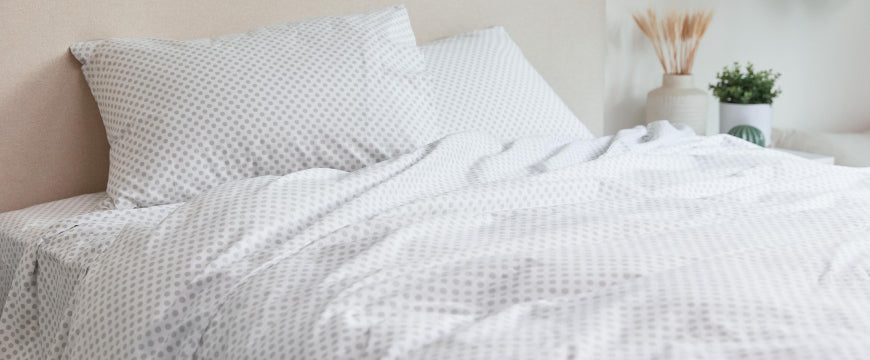
How often should you replenish your bedding?
Share
Your bedsheets touch your body every night, whether you’ve just showered or you’re crashing after a 7-hour sweaty hike. That means your bed is taking quite a hit from everywhere you’ve been, gradually rubbing off specks of your life’s events. Laundry can refresh it all, but only to a certain extent. After a while, you’ll need to replenish your bedding as it accumulates dust, mites, and germs.
The more particles, the greater your chances of catching allergies and, consequently, getting sick. Your bed should be a sanctuary to heal from sickness, not a source of it!
So how long should you wait before replacing your bedding? From our experience making duvets, mattresses, pillows, and more, here are some of our general guidelines:
1. Pillows: wash those pillowcases every 1-2 weeks, and replace the pillows every 1-2 years.
Pillows may not be wrapping around your body, but they’re absorbing a lot of material from your head. Your hair traps a lot of sweat, lice, and oil, which is then transferred to the pillow every time you lay your head on it. These particles spread throughout the pillow, coming into contact with your face for hours every night. This can affect the condition of the skin on your face and neck.
Aside from germs, your pillow needs to retain its structure to properly support your neck and head. How does your pillow’s current shape hold up to its original shape? If it’s now misshapen and not for the better, think about replacing it before it further exacerbates any neck aches you might get.
2. Sheets: replace every 2-3 years.
Sheets come into contact with your body, which means they’ve got a lot of your day to absorb. The more sheets are washed, the more they’ll break down. And if you’ve got pets or other people sharing the bed with you, you’ll have to wash those sheets often.
Different materials will have different lengths of durability. Sheets made of bamboo or luxury cotton might last longer before they become flimsy and misshapen. To make your sheets last longer, alternate between multiple ones.
3. Duvet sets: replace every 5 years.
Due to constant bodily contact, the covers should be washed every 1-2 weeks. Duvets made of high-quality material such as brushed cotton or sateen can last for many years. Duvet fillings lose their fluffiness over time, taking away much of their comfort. After a while, the fillings may even leak.
If your duvet no longer feels even, the fillings have shifted and may be leaking. If you’ve had it for more than a few years, look into a replacement like Lull’s premium down duvet.
